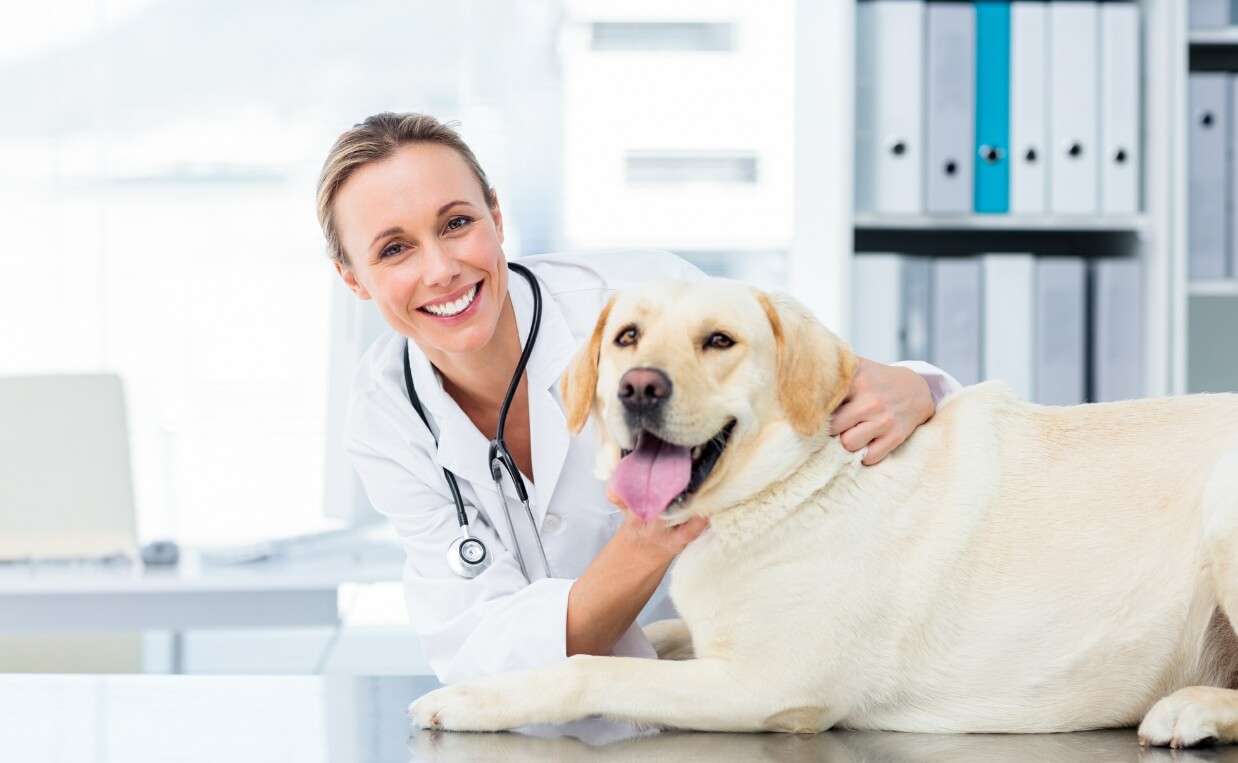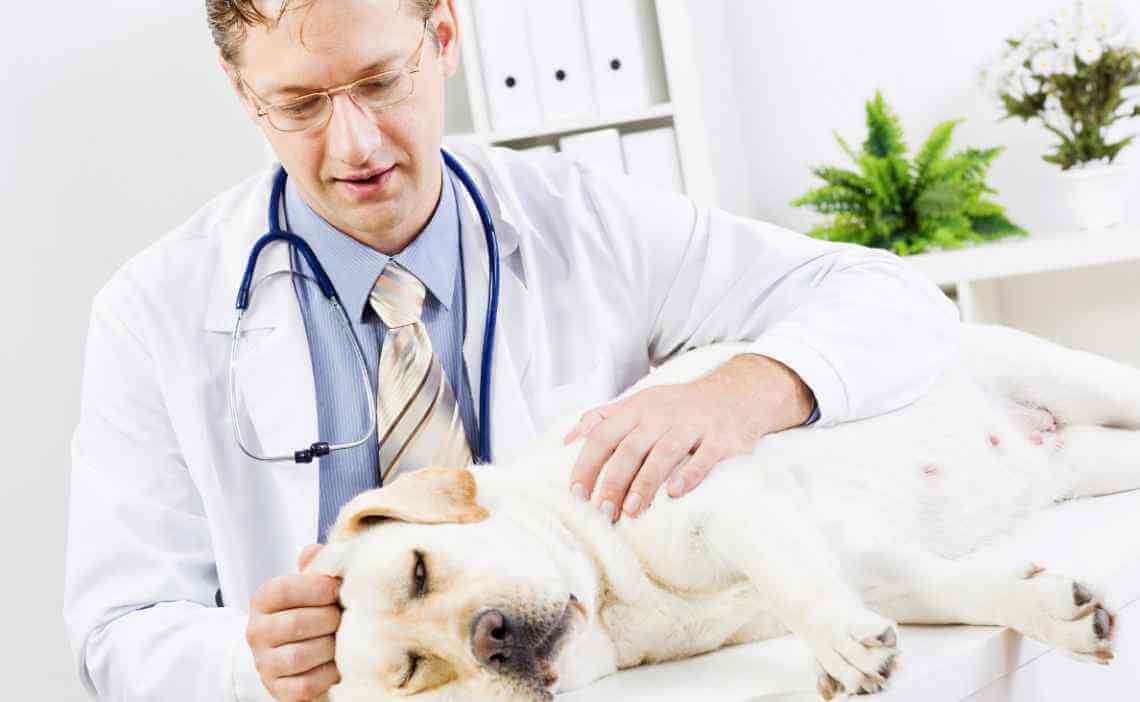
Chances are, when you and your fur buddy visit your veterinarian, you’re both in a hurry to get in and out as quickly as possible. Even if it’s for a routine check-up, most dogs are shaking like a leaf and constantly eyeing the door. But in the rush, you may not take the time to ask important questions.
Not sure where to begin? Here are ten questions veterinarians encourage their patrons to ask.
-
How often should I bring my dog in for wellness visits?
While it’s not something most of us like to think about very often, canines have a shorter lifespan than humans. That means they need checkups more often. Dogs should visit their veterinarian twice a year for a wellness check, which should include:
- Physical exam
- Stethoscope heart check
- Dental exam
- Booster shots if needed

-
Should I give my dog parasite protection medication?
Parasites, such as heartworms, can infect dogs no matter where you live. Parasites can cause health issues, such as lung disease, heart failure, damage to organs and can be lethal. Some parasites can be passed from dogs to people, such as roundworms. Children are more vulnerable to parasite infections from dogs. The American Heartworm Society recommends year-round administration of heartworm (and other parasite) preventative medication. Read more: Do Dogs Really Need Heartworm Prevention Medication?
-
Is my dog a healthy weight? If not, what should I be doing to help him or her?
According to the ASPCA, normally you should be able to easily feel your dog’s backbone and ribs. If you can’t feel their ribs without pressing into their skin, your dog is carrying excess weight. There are many health risks associated with canine obesity. If you suspect your dog is overweight, ask your veterinarian about healthy eating recommendations, such as portion sizes, table scraps and the amount of exercise your dog needs. Read more: 7 Dangers of Obesity in Dogs

-
How important are dental cleanings?
Just like in humans, regular professional dental hygiene is important for your dog’s health. Veterinarian cleanings, generally done under anesthesia, remove tartar and plaque to prevent periodontal disease. Dental and gum disease can prevent costly health problems in the future. Read more: Does Your Dog Have Hidden Dental Disease?
-
What is the best food to feed my dog?
Feed your dog quality food. Look for real ingredients such as chicken, fish and beef. Avoid animal by products, preservatives and additives. Unless you’re sure your dog has a food allergy (which is relatively rare), avoid dog food containing peas, lentils, potatoes and other legumes as the main ingredient. These foods are usually labeled “grain-free”. There has been a link between high levels of peas, potatoes and lentils and dilated cardiomyopathy in dogs. Read more: Grain-Free Diets and Heart Disease in Dogs

-
Do I need pet insurance?
Pets can be expensive, especially if your dog needs major surgery. If you would be put in a predicament if you couldn’t come up with $3,000 or $4,000 for emergency surgery, pet insurance is probably a good idea. Read more: How to Choose the Best Insurance for Your Dog
-
Is my dog’s behavior normal?
Dogs exhibit strange behaviors sometimes and they aren’t always easy for dog parents to understand. If your dog has recently started to exhibit unfamiliar behavior, it’s worth asking your vet to determine if there is an underlying health issue or for suggestions on how to deal with it. Read more: 9 Tips for Getting Your Dog to Stop Barking

-
What can I do to take better care of my dog?
Sometimes there’s something simple you aren’t doing that might be helpful for your dog. It doesn’t hurt to ask.
-
What is the best age to spay or neuter my dog?
Yaay for you for being willing to get your dog spayed or neutered so you don’t add to the 1.2 million dogs euthanized every year in the U.S. Besides overpopulation, there are health and behavioral benefits for your dog.
Most veterinarians recommend getting your dog “fixed” at around six months of age. However, there is a growing body of evidence that delaying spay/neuter surgery until after 11 or 23 months may decrease the risk of joint disorders and cancers.

If you are considering spay/neuter surgery in the near future, you may want to review this research and share with your veterinarian before making a decision about when your dog is scheduled for surgery. Read more: Top 6 Reasons to Spay or Neuter Your Dog
-
Is my dog too old to learn better behavior?
The old adage definitely is NOT true – older dogs CAN learn new tricks! If your dog has a behavioral problem, take positive steps to help your dog. Seek out a professional dog behaviorist or trainer and help improve your dog’s life. Read more: 5 Things You Can Easily Forget When Training Your Dog

The more questions you ask your veterinarian, the more knowledge you will gain to help you be a better dog parent. Take the time to ask questions and then be sure to follow through on the recommendations your vet provides.

What question do you think new puppy or dog parents should ask their veterinarian? Please share with the rest of the Canine Campus community in the comments below.

 How to Choose the Best Insurance for Your Dog
How to Choose the Best Insurance for Your Dog Top 10 Health Concerns for Large Breed Dogs
Top 10 Health Concerns for Large Breed Dogs 5 Tips for Preventing Obesity in Your Dog
5 Tips for Preventing Obesity in Your Dog How to Care for a Dog with Hearing Loss
How to Care for a Dog with Hearing Loss What to Put in a Dog First Aid Kit
What to Put in a Dog First Aid Kit






Leave a Reply